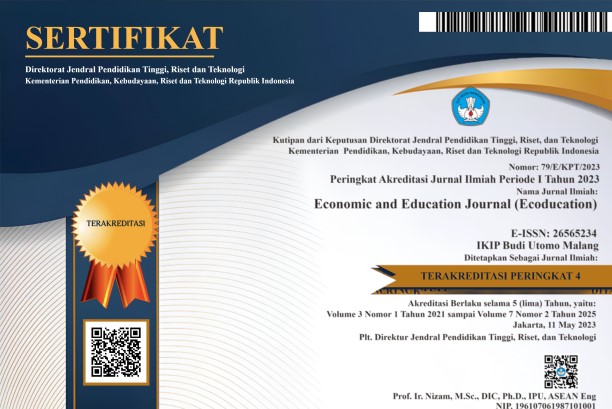The The Influence of Internet Use on Class X Student Learning Outcomes in Economics Subjects
Abstract
Internet is on source of learning that can help student in participating in learning activities, because on the internet there are various kinds of information related to subjects matter. The results of interviews with educators and class X students that in adition to using textbooks as a learning resource, Muhammadiyah Maumere high school students also use the internet as a learning resource. Therefore, there is a need for research on the effect of the use of the internet on the learning outcomes of class X students in economic subjects at Muhammadiyah Maumere High School, with the aim to determine the Effect of Internet Us on Class X Student Learning Outcomes in Economic Subjects at Muhammadiyah Maumere High School. This type of research used in this research in quantitative research. The study had a population of 82 respondents and a sample of 68 respondents. This research uses an instrument in the from of a closed questionnaire. The results of data analysis said that there is an influence of the use of the internet on the learning outcomes of class X students in economic subjects at Muhammadiyah Maumere High School, this is evidenced by hypothesis testing namely Rhitung>Rtable or 4.056>1.995. R square value of 0,200 means that the influence of internet us on student learning outcomes by 20% and 90% is influenced by other variables not examined.
References
Adrianus Aditya, D. (2013). Sosial Media Nation 15 Inspirasi Berjejaring Sosial (ke 1).Retrieved from https://books.google.co.id/books =mE13DAAAQBAJ&lpg=PA121&ots=kJ5fafRsXw&dq=Anne Ahira (2011)%2C Penggunaan internet sebagai media belajar&pg=PR4#v=onepage&q&f=true
Arikunto, S. (2010). Prosedur Penelitian Suatu Pendekatan Praktik. Jakarta: Rineka Cipta.
Darmawan, D. (2014). Pengembangan E-Learning dan Desain. Bandung: PT Remaja Rosdakarya.
Hamiyah, N. dan M. J. (2014). Strategi Belajar-Mengajar di Kelas. Jakarta: Prestasi Pustakaraya.
Priyatno, D. (2010). Teknik Mudah dan Cepat Melakukan Analisis Data Penelitian dengan SPSS dan Tanya Jawab Ujian Pendadaran. Yogyakarta: Gaya Media.
Rusman. (2018). Model-model pembelajaran (2nd ed.). Jakarta: Rajawali Pers. PT Rajagrafindo Persada.
Sitepu, B. P. (2014). Pengembangan Sumber Belajar. Jakarta: Raja Grafindo Persada.
Sugiyono. (2017). Metode Penelitian Pendidikan Kuantitatif, Kualitatif, dan R & D. Bandung: Alfabeta.
Susanto, A. (2013). Teori Belajar dan Pembelajaran di Sekolah Dasar (4th ed.). Jakarta: Prenada Media Group.
















